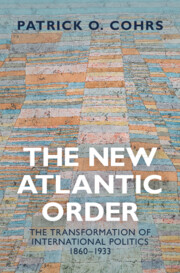Book contents
- The New Atlantic Order
- The New Atlantic Order
- Copyright page
- Dedication
- Contents
- Acknowledgements
- Abbreviations
- Maps
- Introduction
- Part I Inevitable Descent into the Abyss?
- Part II The Greatest War – and No Peace without Victory
- Part III Reorientations and Incipient Learning Processes
- Part IV No Pax Atlantica
- 14 An Impossible Peace?
- 15 Novel Superstructure of a New Atlantic Order?
- 16 No Just Peace without Security
- 17 The Eastern Frontiers – and Limits – of the New Order
- 18 A Formative Threat?
- 19 The Political and Moral Stakes of Reparations
- 20 The Imposed Peace
- 21 The Truncated Atlantic Peace Order of 1919
- Epilogue The Political Consequences of the Peace
- Bibliography
- Index
20 - The Imposed Peace
The Missed Opportunity of a Negotiated Settlement with Weimar Germany?
from Part IV - No Pax Atlantica
Published online by Cambridge University Press: 22 April 2022
- The New Atlantic Order
- The New Atlantic Order
- Copyright page
- Dedication
- Contents
- Acknowledgements
- Abbreviations
- Maps
- Introduction
- Part I Inevitable Descent into the Abyss?
- Part II The Greatest War – and No Peace without Victory
- Part III Reorientations and Incipient Learning Processes
- Part IV No Pax Atlantica
- 14 An Impossible Peace?
- 15 Novel Superstructure of a New Atlantic Order?
- 16 No Just Peace without Security
- 17 The Eastern Frontiers – and Limits – of the New Order
- 18 A Formative Threat?
- 19 The Political and Moral Stakes of Reparations
- 20 The Imposed Peace
- 21 The Truncated Atlantic Peace Order of 1919
- Epilogue The Political Consequences of the Peace
- Bibliography
- Index
Summary
Chapter 20 sheds new light on what arguably was the crucial problem of the peacemaking process of 1919 – the fact that ultimately the peace settlement and the terms and rules of the new order were not negotiated between the victors and the vanquished but imposed by the western powers, above all on the fledgling Weimar Republic. It shows that what led to this outcome were not only the unprecedented transatlantic complexities Wilson and the principal British and French “peacemakers” faced when trying to hammer out the fundamental parameters of the peace and postwar order, and to reconcile their often all but irreconcilable interests, aims and ideological priorities. As it underscores, the imposed peace of 1919 was also the outgrowth of underlying hierarchical assumptions the victors shared about their “right” to dictate terms to the defeated German power and to place it on probation. Also analysing the strategies that leading German policymakers like Brockdorff-Rantzau and Matthias Erzberger pursued to open the door to a negotiated peace it finally reappraises the eventual political-cum-ideological battle between the victors and the vanquished that escalated in 1919 and analysis the destructive consequences of the peace settlement’s ultimate imposition.
Keywords
- Type
- Chapter
- Information
- The New Atlantic OrderThe Transformation of International Politics, 1860–1933, pp. 809 - 877Publisher: Cambridge University PressPrint publication year: 2022

